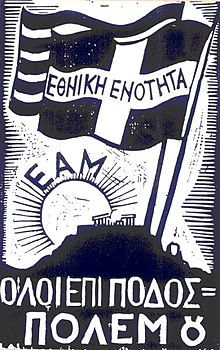
Back Нацыянальна-вызваленчы фронт Грэцыі Byelorussian Нацыянальна-вызвольны фронт Грэцыі BE-X-OLD Национален освободителен фронт на Гърция Bulgarian Front d'Alliberament Nacional (Grècia) Catalan Fronta národního osvobození (Řecko) Czech Εθνικό Απελευθερωτικό Μέτωπο Greek Naciliberiga Fronto (Grekio) Esperanto Frente de Liberación Nacional (Grecia) Spanish Nazio Askapenerako Frontea (Grezia) Basque جبهه آزادیبخش ملی (یونان) Persian
This article needs additional citations for verification. (September 2018) |
National Liberation Front Εθνικό Απελευθερωτικό Μέτωπο | |
|---|---|
 ΕΑΜ poster calling "everyone to arms" | |
| Abbreviation | EAM |
| Leaders | Georgios Siantos, Alexandros Svolos, Ilias Tsirimokos |
| Founded | 1941 |
| Dissolved | 1946 |
| Merged into | Democratic Army of Greece |
| Youth wing | United Panhellenic Organization of Youth |
| Paramilitary wing | Greek People's Liberation Army |
| Ideology | Republicanism Socialist patriotism Socialism Communism Left-wing nationalism Anti-fascism |
| Political position | Left-wing to far-left |
| Religion | Secularism |
| Participants | Communist Party of Greece Socialist Party of Greece Agrarian Party of Greece Union of People's Democracy |
The National Liberation Front (Greek: Εθνικό Απελευθερωτικό Μέτωπο, Ethnikó Apeleftherotikó Métopo, EAM) was an alliance of various political parties and organizations which fought to liberate Greece from Axis Occupation. It was the main movement of the Greek Resistance during the occupation of Greece. Its main driving force was the Communist Party of Greece (KKE), but its membership throughout the occupation included several other leftist and republican groups. ΕΑΜ became the first true mass social movement in modern Greek history. Its military wing, the Greek People's Liberation Army (ELAS), quickly grew into the largest armed guerrilla force in the country, and the only one with nationwide presence. At the same time, from late 1943 onwards, the political enmity between ΕΑΜ and rival resistance groups from the centre and right evolved into a virtual civil war, while its relationship with the British and the British-backed Greek government in exile was characterized by mutual mistrust, leading EAM to establish its own government, the Political Committee of National Liberation, in the areas it had liberated in spring 1944. Tensions were resolved provisionally in the Lebanon Conference in May 1944, when EAM agreed to enter the Greek government in exile under Georgios Papandreou. The organization reached its peak after liberation in late 1944, when it controlled most of the country, before suffering a catastrophic military defeat against the British and the government forces in the Dekemvriana clashes. This marked the beginning of its gradual decline, the disarmament of ELAS, and the open persecution of its members during the "White Terror", leading eventually to the outbreak of the Greek Civil War.